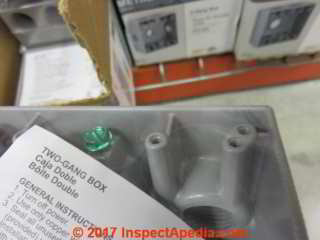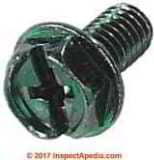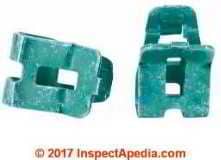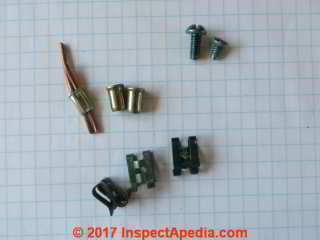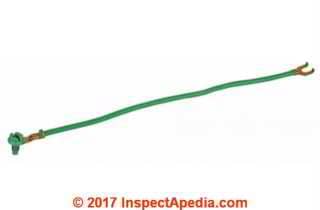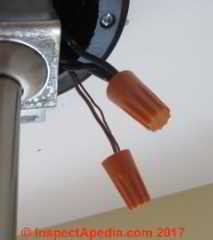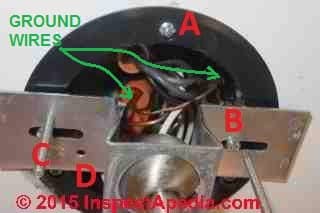 Electrical Box Ground Connections
Electrical Box Ground Connections
Q&A on how to join electrical ground wires in the box
- POST a QUESTION or COMMENT about electrical ground wiring splices, connections, connectors
How to make proper & safe electrical ground wiring connections in the box:
This article describes options for connecting a metal electrical box to the grounding conductor & connecting the grounding conductor to a fixture such as a ceiling light or ceiling fan.
Page top photo: ground wire for the ceiling fixture itself is connected to the grounding conductor by a twist-on connector while and a crimp connector connects all other ground wires inside the box. Grounds are marked by the green arrows. Click to enlarge this image and to see details. because this is a plastic ceiling-mount electrical box, a connection of the ground wire to the box itself is not required.
This article answers nearly all questions about residential ground wiring & electrical grounding safety in older homes.
InspectAPedia tolerates no conflicts of interest. We have no relationship with advertisers, products, or services discussed at this website.
- Daniel Friedman, Publisher/Editor/Author - See WHO ARE WE?
Electrical Box Ground Requirements & Methods
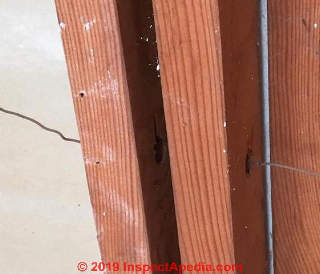 On 2020-03-28 by Doug
- bare electric ground wire run through building walls
On 2020-03-28 by Doug
- bare electric ground wire run through building walls
Thanks. There are bare #12's going into the sub-panel and perhaps into the SE panel. The Fed-Pac StabLok sub-panel was installed without a ground bar
(because the feeder cable and all the branch cables have no grounding conductor). So the panel enclosure itself is not even grounded. A bare #12 goes into a hole in the sub-panel but is not actually connected, not sure yet what is going on there.
Maybe the bare #12 is attached to a water pipe under the house. We're replacing the sub-panel and will provide a proper ground wire to it from the SE panel. (Also replacing the SE panel.)
This Q&A were posted originally
at ELECTRICAL INSPECTION, DIAGNOSIS, REPAIR
On 2020-03-28 - by (mod) -
I'd have preferred an 8/3 WG (With Ground); or if running a separate ground wire, though bare is permitted,
IMO it's safer to use an insulated copper wire so that there's no chance of accidentally electrifying some bystanding component like a water pipe should a short to ground occur. At least take care in routing.
On 2020-03-28 by Doug
See pic of ground wire. I think the wire was added in the kitchen area to ground the appliances (in 1958).
In some cases, it's in the studs, elsewhere on the surface of the stud (that is, between stud and sheetrock).
But we're running a new 8/3 cable w.ground, from the SE panel to the kitchen for a new 40A oven. So we'll run a new bare #12 from the oven junction box to the kitchen outlets (which are fed from the SE panel), as permitted by NEC, and abandon the old ground wire.
On 2020-03-28 - by (mod) -
Doug I might think that bare ground wire is OK for "something" but I don't know what.
IF you can follow the wire to an electrical box we can see the connections there. E.g. a metal box might be grounded to this wire AND the same wire might be extended to ground connection screw on the device such as a switch or electrical receptacle.
At the other end we'd expect to see the wire connected to the ground bus/neutral bus in the electrical panel.
If the ground wire is the same size as other copper wire in the branch circuit it serves, such as #14 copper, then it might be functional.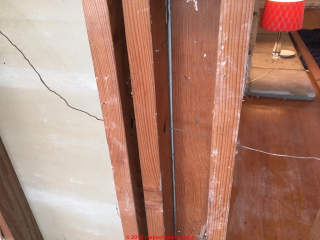 All of this is wild guessing to this point.
All of this is wild guessing to this point.
On 2020-03-28 by Doug
see image
On 2020-03-27 - by (mod) -
Do you think tne ground may have been added?Follow the ground to see how it is connected to devices and boxes.
Use the add image button.
Watch out: also see FEDERAL PACIFIC FPE HAZARDS
On 2020-03-26 by Doug
Hi, I'm helping a friend replace some outlets and fixtures, and replace a Fed. Pacific sub-panel.
The house was built in 1958 and seems to be mostly done with NM-2 with no ground.
Here's the odd thing -- in the kitchen walls, which we opened up, there is a single #14 wire going through the studs, through nicely drilled holes about 20" off the floor. I checked with a volt-meter and it goes to ground. One of the outlet boxes is tied to it.
Never seen that before. Did the original electricians put it in there in order to ground the kitchen appliances perhaps?
Reader Question On 2017-06-24 by TheDude: connecting the electrical grounds seems like excessive work?
Preparing for rough in. All outlet and switch boxes are spliced with appropriate pigtails.
Light fixture boxes were not touched but I have been told so strip and splice them.
Do I need to pigtail the grounds like the electrical boxes? Do I need to strip the wires and wirenut them as well? That seems like excessive work.
State = Minnesota
On 2017-06-25 by (mod) re: Metal boxes need to be connected to ground - ground wire connectors for wire-to-wire & wire-to box
Metal electrical boxes such as junction boxes, metal gang boxes, or metal receptacle, light or ceiling fan mounting boxes all need to be connected to the system ground, and of course all 120V and 220V circuit wire electrical splices must be made inside of a properly-sized and rated box.
Our photo above shows the manufacturer-provided green ground-screw intended for bonding this (wet location rated) two-gang metal electrical box to the grounding conductor.
If your electrical box does not include the ground-connecting screw you can either buy and use a green ground 3/8" x 10-32 threaded grounding screw from your electrical supplier or you may in some cases use a metal ground clip that bonds the ground wire to the side of the metal box. We show both of these devices in photos below.
Ground wires are bonded together in the box, a crimp is better than a twist on connector for that purpose, as a twist-on connector may crowd the box. In my photo below you can see my demonstration of having used a ground wire crimp-on clip to join two wires.
And a ground needs to be kept available to connect the ground of the light fixture to be installed. If you need an extra length of ground wire to connect the electrical box to a grounding screw on your light fixture or fan or other device, you might buy a pre-assembled 6-inch green ground wire provided with the ground screw (to connect to the electcrical box) on one end and a convenient u-clip on the wire's other end designed to connect to a ground screw on the fixture or device.
Below you can see our use of an orange twist-on connector to splice the ceiling light fixture's mult-strand ground wire to the circuit solid copper ground wire. Later we will of course push these wires carefully back up into the ceiling box.
See CEILING LIGHT FIXTURE INSTALLATION
...
Continue reading at ELECTRICAL GROUNDING in OLDER HOMES or select a topic from the closely-related articles below, or see the complete ARTICLE INDEX.
Or see these
Recommended Articles
- ELECTRICAL GROUNDING in OLDER HOMES
- FALSE GROUND at RECEPTACLES
- FALSE GROUND, BOOTLEG & FLICKERING LIGHTS
- GAS PIPING GROUND BOND
- GROUND SYSTEM INSPECTION - home
- KNOB & TUBE WIRING
- LOST ELECTRICAL GROUND
- LOST NEUTRAL SHOCKS HOMEOWNER
- SAFETY for ELECTRICAL INSPECTORS - home
- SERVICE GROUNDING DEFECTS
Suggested citation for this web page
ELECTRICAL BOX GROUND WIRING at InspectApedia.com - online encyclopedia of building & environmental inspection, testing, diagnosis, repair, & problem prevention advice.
Or see this
INDEX to RELATED ARTICLES: ARTICLE INDEX to ELECTRICAL INSPECTION & TESTING
Or use the SEARCH BOX found below to Ask a Question or Search InspectApedia
Ask a Question or Search InspectApedia
Try the search box just below, or if you prefer, post a question or comment in the Comments box below and we will respond promptly.
Search the InspectApedia website
Note: appearance of your Comment below may be delayed: if your comment contains an image, photograph, web link, or text that looks to the software as if it might be a web link, your posting will appear after it has been approved by a moderator. Apologies for the delay.
Only one image can be added per comment but you can post as many comments, and therefore images, as you like.
You will not receive a notification when a response to your question has been posted.
Please bookmark this page to make it easy for you to check back for our response.
IF above you see "Comment Form is loading comments..." then COMMENT BOX - countable.ca / bawkbox.com IS NOT WORKING.
In any case you are welcome to send an email directly to us at InspectApedia.com at editor@inspectApedia.com
We'll reply to you directly. Please help us help you by noting, in your email, the URL of the InspectApedia page where you wanted to comment.
Citations & References
In addition to any citations in the article above, a full list is available on request.
- Mark Cramer Inspection Services Mark Cramer, Tampa Florida, Mr. Cramer is a past president of ASHI, the American Society of Home Inspectors and is a Florida home inspector and home inspection educator. Mr. Cramer serves on the ASHI Home Inspection Standards. Contact Mark Cramer at: 727-595-4211 mark@BestTampaInspector.com
- John Cranor [Website: /www.house-whisperer.com ] is an ASHI member and a home inspector (The House Whisperer) is located in Glen Allen, VA 23060. He is also a contributor to InspectApedia.com in several technical areas such as plumbing and appliances (dryer vents). Contact Mr. Cranor at 804-873-8534 or by Email: johncranor@verizon.net
- Timothy Hemm, Yucala, CA, contributed various photographs of electrical equipment installed in California buildings. Mr. Hemm can be contacted at TimHemm@yahoo.com
- NFPA - the National Fire Protection Association can be found online at www.nfpa.org
- The 2008 NEC National Electrical Code (ISBN 978-0877657903) Online Access LINK (you'll need to sign in as a professional or as a visitor)
- The 2008 Residential Wiring Code, a subset of the 2008 NEC, can be understood through Mastering the NEC at http://www.2008nec.com/shopping/pgm-more_information.php?id=18
- "Electrical System Inspection Basics," Richard C. Wolcott, ASHI 8th Annual Education Conference, Boston 1985.
- "Simplified Electrical Wiring," Sears, Roebuck and Co., 15705 (F5428) Rev. 4-77 1977 [Lots of sketches of older-type service panels.]
- "How to plan and install electric wiring for homes, farms, garages, shops," Montgomery Ward Co., 83-850.
- "Simplified Electrical Wiring," Sears, Roebuck and Co., 15705 (F5428) Rev. 4-77 1977 [Lots of sketches of older-type service panels.]
- "Home Wiring Inspection," Roswell W. Ard, Rodale's New Shelter, July/August, 1985 p. 35-40.
- "Evaluating Wiring in Older Minnesota Homes," Agricultural Extension Service, University of Minnesota, St. Paul, Minnesota 55108.
- "Electrical Systems," A Training Manual for Home Inspectors, Alfred L. Alk, American Society of Home Inspectors (ASHI), 1987, available from ASHI. [DF NOTE: I do NOT recommend this obsolete publication, though it was cited in the original Journal article as it contains unsafe inaccuracies]
- "Basic Housing Inspection," US DHEW, S352.75 U48, p.144, out of print, but is available in most state libraries.
- In addition to citations & references found in this article, see the research citations given at the end of the related articles found at our suggested
CONTINUE READING or RECOMMENDED ARTICLES.
- Carson, Dunlop & Associates Ltd., 120 Carlton Street Suite 407, Toronto ON M5A 4K2. Tel: (416) 964-9415 1-800-268-7070 Email: info@carsondunlop.com. Alan Carson is a past president of ASHI, the American Society of Home Inspectors.
Thanks to Alan Carson and Bob Dunlop, for permission for InspectAPedia to use text excerpts from The HOME REFERENCE BOOK - the Encyclopedia of Homes and to use illustrations from The ILLUSTRATED HOME .
Carson Dunlop Associates provides extensive home inspection education and report writing material. In gratitude we provide links to tsome Carson Dunlop Associates products and services.


